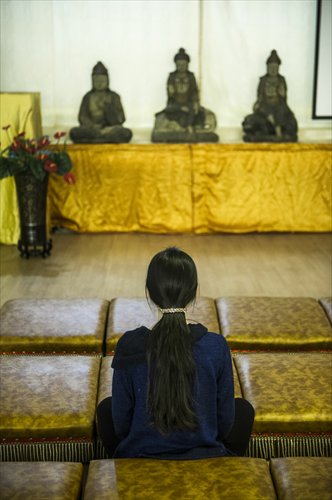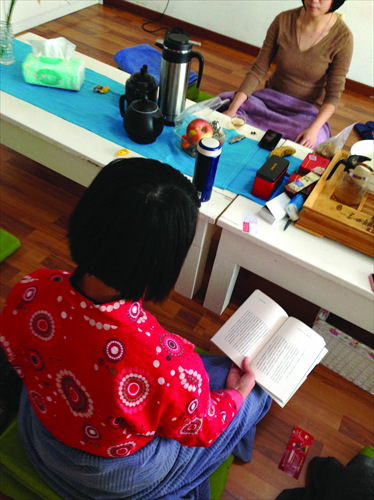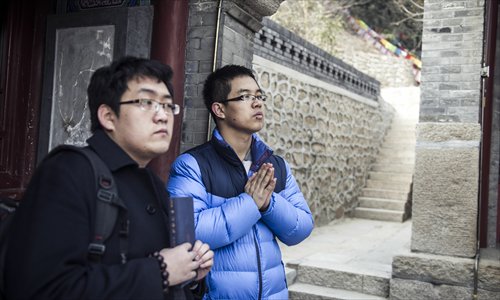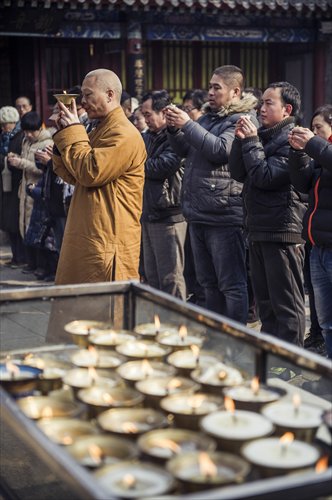Sects in the city

Buddhist meditation has a strong secular following in Beijing, with many people embracing the practice after experiencing brief stays at monasteries. Photo: Li Hao/GT
Inside the living room of a modern Chaoyang district apartment, the rich aromas of green tea and burning incense fill the air. A group of eight people, their faces solemn yet relaxed, sit cross-legged opposite each other in a deep meditative trance.
After 45 minutes, Wang Tao slowly opens his eyes and basks in his newfound state of spiritual refreshment. He ladles his homemade white fungus and jujube soup into bowls for his companions, who collectively rent the apartment for their meditation. Low voices hum over the sipping of tea and munching of snacks as they reflect on their latest session.
"I meditate almost daily over winter. When winter passes, I have different experiences and feelings towards things and people [compared to other seasons]," said Wang, a middle school computer science teacher.
Wang, 37, is part of an influx of urbanites learning Zen Buddhist meditation. Zen, known as chan in Chinese, is a school of Buddhism developed in China during the Tang Dynasty (618-907). It consists of meditation, sutra chanting and lay services.
An online search of Buddhist meditation groups in Beijing returns thousands of listings of organizations that hold regular activities both in cities and secluded mountainside retreats.
Once just practiced by Buddhist holy men and women, the ancient religion's meditative techniques are increasingly being embraced by secular followers eager to improve their physical and mental well-being while pursuing the path of enlightenment.
Quest for Nirvana
Before 2008, Wang said he considered Buddhist meditation as "mysterious and out of reach." He discovered the practice in October that year when he joined around 200 others in participating in a week-long Buddhism autumn camp at Chaoyang Temple in Huairou district that cost 600 yuan ($99) per person.
Since 2003, the temple has invited city dwellers to experience monastery life and learn about Buddhist philosophy during winter and summer vacations as well as national holidays. Participants are usually young people, particularly university students, who don't necessarily identify as Buddhist.
They chant and write sutras, meditate and engage in rituals that include passing candles and tea ceremonies. Manual labor is also involved, with binding sutra books and carrying bricks all considered part of the path to enlightenment. Dressed in casual clothes instead of robes, members are required to follow monks' orders throughout the camp.
"It was like being introduced to a new lifestyle, a new way of thinking. It felt like being immersed in a totally strange world, but I was happier and felt as if it was how life ought to be," Wang recalled.

A woman chants Buddhist sutras to complement her meditation. Photo: Yin Lu/GT
Becoming a Buddhist
Wang was one of around 20 people to convert to Buddhism at a ceremony held at the end of the camp. He returned to the temple to work as a volunteer whenever he had the chance. "In the workplace, people give because they want something in return, but [at the temple] we only give and don't expect anything back. When you aren't getting and only giving, you feel a sense of happiness," he said.
Shortly after his conversion, Wang founded his own meditation group. Not every member is a Buddhist and some eat meat, but they all meditate regularly and read Buddhist scriptures. They meet during weekdays at their Chaoyang district apartment and on weekends at a cottage nestled in north Beijing's mountains in Huairou district.
Between meditating at temples with monks and in the city with laypeople, Wang and other members of his group share the opinion that there is "not much difference" in atmosphere between the two settings. Most prefer meditating in the city, however, because it involves minimal disruption to their normal lives.
During his meditative journey over the past five years, Wang has experienced different stages. "At some point, my way of thinking suddenly changed. You purge everything from the past and feel [spiritually] lifted," said Wang, who credits meditation for maintaining his youthful appearance.
Motivations for meditation
Meditation groups in Beijing comprise people from all walks of life whose reasons for taking up the practice are as different as their backgrounds.
Wang Xinyu, 45, turned to Zen Buddhism to "find herself" after feeling lost in her work at a TV station. "I used to indulge in flattery and gossip, but now I see things differently. My personality has changed," she said.
Xian Gui, a high school teacher, was intrigued to explore Buddhism deeper as part of her interest in theology. After reading about many different religions, she found peace in Zen Buddhism. "People are quick to assume I've experienced setbacks in life like failed relationships, but I haven't," she said.
"People come to learn about all sorts of ideas," said Jin Dali, who founded his own Zen Buddhist meditation group in 2012. Some are curious about the religion's philosophy, while others hope meditation will help them lead a longer, more fulfilling life. Many have experienced obstacles in life and view meditation as a way to better handle hardships in life, said Jin.
Jin also manages a public account for his group on mobile messaging application WeChat that has around 50,000 followers, who ask Jin about everything from how to improve their relationship with their parents-in-law to managing work-related stress.
Jin said those most interested in meditation are from what he described as the "three-high group," namely people who have a high educational background, income and social status.

Some urbanites' quest for spiritual enlightenment leads them to temples where they are introduced to Zen Buddhist meditation. Photo: Li Hao/GT

Some urbanites' quest for spiritual enlightenment leads them to temples where they are introduced to Zen Buddhist meditation. Photo: Li Hao/GT
Healthy body and mind
Results of a study by Yale University in 2005 showed meditation alters resting brain patterns, which can slow deterioration of the brain linked to aging.
Further supporting the benefits of meditation, an academic paper published by Chinese magazine Medicine and Philosophy in 2010 found that psychotherapy rooted in Zen Buddhist meditation can improve practitioners' overall mental health.
But regardless of their motivations for meditation, all followers share the common goal of developing their mind as part of their pursuit of tranquility and deep concentration. "The ultimate goal of meditation is enlightenment unfettered by thought, mood or desire," said Jin.
Focus on breathing
The first technique newcomers to meditation must master is breathing, said Gao Yiheng, the shixiong (senior male apprentice) who leads sessions in Wang Tao's group. Gao, who has practiced meditation for more than a decade at different temples all over China, said breaths must be repeatedly counted from one to 10 by practitioners as they sit with legs crossed and eyes closed.
"It's actually about training the mind rather than breathing. Counting focuses the mind and breathing is just a tool. When you have distorted thoughts, you're unlikely to be able to count properly," said Gao.
Entering a meditative trance slows one's heart rate and causes body temperature to drop, said Gao. "At first, [the process] can be very painful. It can be hard to contain one's thoughts and legs can ache. Everybody goes through that first phase," he said. "But when you don't expect anything from meditation, you actually gain more."
Push for commercialization
Because techniques are usually acquired by learning from teachers and Buddhist texts, Jin warned meditation without guidance can be "dangerous." He advises newcomers to always find a mentor because misunderstandings and faults in practice can harm one's mental and physical health.
Choosing the right group to meditate with is important, too. Gao said there are many groups run by fraudsters who use meditation as a guise to trick people out of their money.
"The lesser hermit lives in seclusion in the countryside, but the greater hermit lives in the city," noted Jin, quoting an ancient Chinese proverb that holds the most rewarding state of tranquility is actually found amid chaotic surrounds.
Jin is often invited to give talks at companies and universities, but he has higher aims. Seeing strong potential in the meditation market with more people preferring small groups rather than temples, he wants to get involved in the educational side of Zen Buddhism.
Jin pointed out that many Westerners, including late co-founder of tech giant Apple Steve Jobs, are among followers of Zen Buddhism due to the promotion of its teachings through books such as Zen Mind, Beginner's Mind (1970) by famed Japanese monk Shunryu Suzuki.
While Zen monasteries for laymen flourish in many Western cities, Jin said the scene is far different in China, where the religion remains mysterious.
"I want to pass Buddhism and its techniques on to more people," said Jin. "There is no limit to the tranquility. The calmer one is, the more self-improvement they can make."